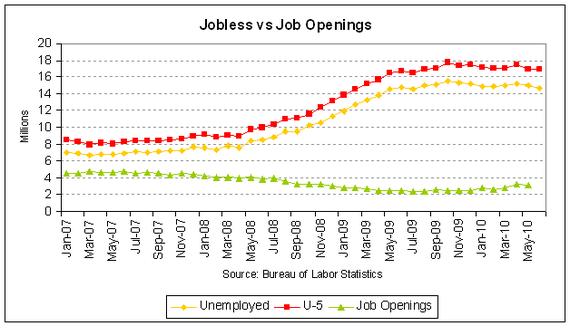Where is the Outrage?
I take seriously — and normally accept — the argument that overly generous unemployment benefits will prolong unemployment and invite dependency.
But if I were a Republican senator, I’d vote to extend unemployment benefits beyond 99 weeks. Today’s unemployed face an economic landscape in which jobs do not exist even for the most willing workers.
Scott Winship posted this very scary chart on the website I edit, FrumForum.com:
By Winship’s calculation, the ratio of available jobs to unemployed persons is the lowest since World War II — almost three times worse than during the next deepest recession, 1981–1983.
More than 4 million people have been out of work for six months or longer, and every day more unemployed Americans pass the 99-week mark at which their benefits expire. Some of those who exhaust their unemployment benefits may qualify for Temporary Assistance for Needy Families. But others will not. What happens to them?
And when will we ever hear from them?
The most surprising thing about this recession, at least to me, has been the total absence of an economic protest movement by the unemployed and the foreclosed. Yes, we have the Tea Party protesting on behalf of taxpayers who also worry about an uncertain future. Yet the Tea Party's ranks are recruited from the "have mores" of American society: Twenty percent have incomes of more than $100,000, compared with 14 percent of American households generally.
The "have less" demographic, however, has fallen silent.
Time and again in American history, the hard-pressed and dispossessed have spoken loudly, fiercely, in the public square. Not this time. There are no Populists or Wobblies, no Bonus Marchers or sit-down strikers. And this time, the have-less demographic has not even attracted a Bruce Springsteen to sing “Born in the USA” on their behalf, or a Michael Douglas to star in “Falling Down.”
As Michael Tomasky marveled of the Tea Party in the liberal journal em>Democracy<:
“We’ve experienced the greatest economic crisis since the 1930s, and the only mass movement to emerge from that reality is a right-wing populist one.”
Given that, it’s not surprising that an unemployment benefit extension has become so controversial — or that Republicans who share my desire to vote “aye” would hesitate, knowing the consequence might be a primary challenge from the right. It’s true, for example, that Sen. Jim Bunning, the Kentucky Republican who in February filibustered a previous unemployment extension, was pushed into retirement. But Bunning’s preferred successor in Kentucky is Tea Party hero Rand Paul, who crushed a more mainstream opponent backed by GOP Senate leader Mitch McConnell. In Republican primaries, the power of populism is not an empty threat.
Perhaps the unemployed have been so deeply disillusioned by the failure of President Obama’s job-creation policies that they have abandoned politics and lost their public voice. Perhaps many of them have secret resources or family ties to sustain them and ward off despair. Or perhaps, as we settle more deeply into our long stretch of joblessness, the Tea Party is only the first wave of popular discontent. It could be another storm is yet to come.
Originally published in The Week.


